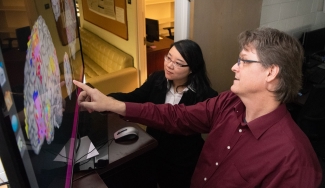Jiaying Liu and Lawrence Sweet are working to produce scientific data to inform the public about vaping products and to guide efforts toward enacting bans on flavored products:
Liu, assistant professor of communication studies, and Sweet, professor of psychology and director of the Clinical Neuroscience Laboratory, have teamed up to investigate vaping among young adults. Liu secured internal grant funding through the Office of Research, and they conducted a pilot study over the summer, collecting data used to apply for support for a more comprehensive study.
Jiaying Liu: E-cigarettes are the most commonly used tobacco product among youths and young adults. In 2011, the use of e-cigarette products was only 1.5% among youths. In 2018, it was more than 20%. This is very alarming. We know tobacco use has been declining for several years because of very effective tobacco-control efforts. Some people think e-cigarettes are a harm-reduction product because they don’t burn the tobacco, so there’s no tar and, in theory, no carcinogen to lead to cancer.
Lawrence Sweet: Others think e-cigarette use could be a gateway device that will cause nicotine addiction and dependence that ultimately lead to trying cigarettes and, long term, actually re-normalize smoking in our society.
Liu: We found several studies that confirmed that for every one adult smoker who quits smoking with the use of e-cigarettes, there are 81 never smokers—youths or young adults—who actually initiate smoking after e-cigarette use.
Read the entire Q-and-A by our colleagues in the office of research. An important and timely interdisciplinary collaboration with potentially far-reaching implications for public health.

